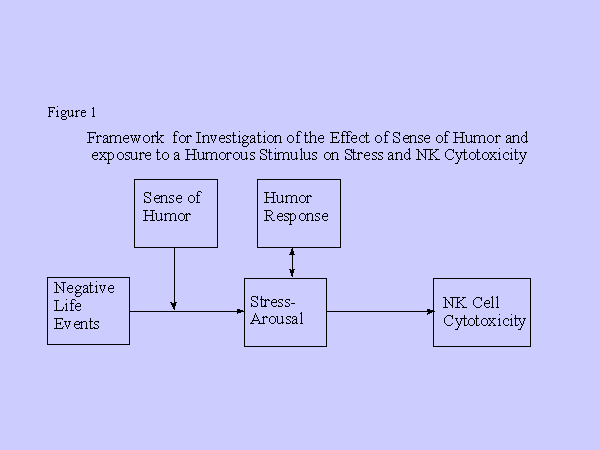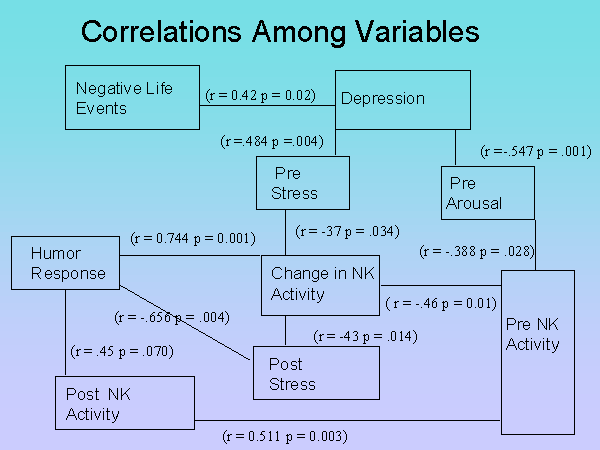Conceptual Framework from Bennett 1997
Interest in the influence of psychological factors on susceptibility to certain disease states goes back to the times of Galen, when it was noted that persons who developed cancer often had a "melancholic" personality (Kaplan & Reynolds, 1988). Since that time, numerous clinicians have shared anecdotal data concerning the development of cancer or other diseases in persons with certain psychological styles, or after a severe life event, such as bereavement (Locke & Kraus, 1982). Selye (1950) was one of the first to document the general effect of a stressor on the autonomic nervous system, neuroendocrine system, and lymphatic organs. According to his theory, environmental demands are viewed by the organism as stressful and produce a common stress response from the organism. This response leads to physiological arousal and, if unrelieved, can lead to structural and functional damage to the organism. Further studies established that activation of the stress response could also be triggered by acute emotions, physical exertion, cold, and pain (Cannon, 1953). Subsequently, Lazarus and Folkman (1984) broadened the definition of stress from Selye's concept of response to "environmental demands" to include psychological components such as appraisal and coping. According to Lazarus and Folkman (1984), stress is "a particular relationship between the person and the environment that is appraised by the person as taxing or exceeding his or her resources and endangering his or her well-being" (p. 19). While Lazarus and Folkman's theory helped to explain the moderation of stressors by use of coping mechanisms, it did not attempt to explain the possible consequences of these coping mechanisms in terms of effects on immune functioning or health. A recent field of inquiry, psychoneuroimmunology (PNI), has attempted to bring all of these factors together.
Psychoneuroimmunology developed from a multifactorial model of illness that includes stress, coping, and resultant disease (Engel, 1962). This theory was further developed by Solomon (Solomon & Moos, 1964; Solomon, 1985; Solomon, 1987), to include the impact of stress on the immune system in the development of disease. Later, the term "psychoneuroimmunology" or PNI was coined by Ader and Cohen (1981), to describe the basic phenomena of this theory: interactions between the nervous system, the neuroendocrine system, and the immune system. These interactions may play a part in subsequent disease development/progression. According to PNI theory, the central nervous system (CNS), peripheral nervous system (PNS), endocrine system, and immune system are part of an intricate communication and feedback system. Therefore, any action that causes changes in one part of this system, such as the central nervous system, could potentially cause changes in the other parts of the PNI system, such as endocrine or immune function. Use of PNI theory could explain how mental "stress", which causes changes in neurotransmitters in the CNS and changes in hormone levels in the endocrine system, could also induce changes in immune functioning, which can ultimately influence susceptibility to disease. Because PNI theory acknowledges the multifactorial nature of wellness and illness, it is particularly useful as a guide for nursing research and practice (Birney, 1991).
The following PNI propositions were tested in this dissertation:
- A complementary intervention (use of humor) can reduce stress and enhance or optimize immune function (Solomon 1987). For this study, a humorous video was used to stimulate mirthful laughter and to investigate the effect of humor response upon stress and NK cell cytotoxicity.
- Enduring coping style and personality factors (so-called "trait" characteristics) are able to modify the effects of negative life events on an individual's immune system (Solomon 1987). For this study, the relationships among negative life events, sense of humor, humor response, stress, arousal, and baseline NK cell cytotoxicity were investigated. See figure 1 for conceptual framework.
- Effect of Humor Response (Laughter) on Change in NK activity
- Effect of Humor Response on Post Stress
- Effect of Pre-Stress and Post Stress on Change in NK activity
- Effect of negative life events on Stress
- Moderating effect of Sense of Humor on the relationship between life events and stress (This makes sense, as I did not find a relationship between life events and stress, so, of course, I could not demonstrate a moderating effect of another variable on a nonexistent relationship)
- Effect of baseline (pre) stress on baseline (pre) NK activity
- Effect of negative life events on depression
- Effect of Depression on stress and arousal
- Effect of Pre-NK activity on Post NK activity and change in NK activity
- Effect of Pre-Arousal on Pre NK activity

Complete study results in conceptual map format

Proposed Relationships that were supported in this study
Proposed Relationships that were not
supported in this study
Supported Relationships that were not in the original Map but could have been predicted from theory and literature review
Last Modified 01/20/09